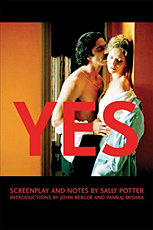In Yes, her most astonishing work since Orlando, risk-taking filmmaker Sally Potter uses a passionate love story to explore many of the bases of conflict and separation in our torn and tattered world: terrorism, the cultural divide between the West and the Muslim world, marriage and sexual politics, and the bigotry that fuels the flames of hatred against immigrants. This paperback contains the screenplay, which in itself is very unusual since it is written completely in verse. There are 28 color photographs and question-and-answer sessions with Sally Potter and Joan Allen taken from discussions with festival audiences who had screened the film.
In a letter to the filmmaker, critic John Berger dissects one of the major themes of Yes: "Desire is as much to do with the taking away of the other's pain as with the mutual pursuit of pleasure. And the marvelous love scenes in Yes recognize this. This doesn't mean that desire is a narcotic or a painkiller. Rather, it is an alternative, shared use of physical energy and the special lucidity of the body, to bestow, if only for a brief moment, an exemption."
In his introduction, Pankaj Mishra notes the importance of the house-cleaner "to remind us of this karmic truth of our interconnected world: of the cleanliness and purity that is an 'illusion' and the dirt that is shuffled around but 'is always there.' To arrive at such knowledge is to begin to learn humility, to know that, as the cleaner puts it, 'everything you do or say is there, forever' and to understand the importance of individual acts of kindness and love."
In one session with an audience, Potter admits the title of the film comes from the last word in James Joyce's Ulysses, his great stream-of-consciousness project. Spend some time with this screenplay and you will not regret it: there is much here to ponder and to appreciate.
